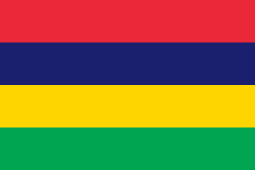Flag of Mauritius
 | |
| The Four Bands, Les Quatre Bandes | |
| Use | National flag |
|---|---|
| Proportion | 2:3 |
| Adopted | March 12, 1968 |
| Design | Four horizontal bands of red, blue, yellow and green. |
| Designed by | Gurudutt Moher |
 | |
| Use | Civil ensign |
| Proportion | 1:2 |
| Design | A red field with the national flag in and the coat of arms in a white circle on the fly side. |
 | |
| Use | State ensign |
| Proportion | 1:2 |
| Design | A navy blue field with the national flag in the canton corner, with the coat of arms on the fly side of the flag. |
 | |
| Use | Naval ensign |
| Proportion | 26:57 |
| Design | A white field with a blue band on each side, followed by two red stripes with the middle red stripe being thinner, charged with an anchor with a gold five-pointed star above it. |
 | |
| Use | Presidential standard |
| Proportion | 2:3 |
| Design | The national flag with a white circle, within it the coat of arms, below it, a golden wreath and the letters RM. |
The national flag of Mauritius, also known as the Four Bands and Les Quatre Bandes (French for "the four bands"), was adopted upon independence, March 12, 1968. It consists of four horizontal bands of equal width, coloured (from top to bottom) red, blue, yellow, and green. The flag was recorded at the College of Arms in London on 9 January 1968.
The flag was designed by Gurudutt Moher whose contribution was recognised posthumously in March 2018 in the form of the national title Member of the Star and Key of the Indian Ocean (MSK).[1] Moher, who was a retired school teacher, died of a heart attack on October 7, 2017 at the age of 93.
The civil ensign (for private vessels) and government ensign (for state vessels) are red and blue flags, respectively, each with the national flag in the canton and the coat of arms of Mauritius in the fly.
The naval ensign (used by coast guard vessels) is an unusual design consisting of red, white, and blue vertical stripes of unequal widths defaced by a central anchor/key emblem.
Colours
The flag of Mauritius consists of red, blue, yellow and green bands which officially stand for:[2]
- Red represents the struggle for freedom and independence.
- Blue represents the Indian Ocean, in which Mauritius is situated.
- Yellow represents the new light of independence.
- Green represents the agriculture of Mauritius and its colour throughout the 12 months of the year.
In an attempt to unite the nation, especially following the deadly and divisive 1965 Mauritius race riots and 1968 Mauritian riots, the colours also have political origins. Indeed the colours also represent the main political parties which existed at the time, namely:[3]
- Red: Parti Travailliste
- Blue: PMSD
- Yellow: IFB
- Green: CAM
The official colour codes of the flag are in accordance with the Mauritius Standard Bureau.[4]
Colour; Pantone Fashion home cotton
- Red 18-1664TC or 185 C
- Blue 19-3939TC or 295 C
- Yellow 14-0957TC or 116 C
- Green 17-6030TC or 356 C
(1968–present) |
Red | Blue | Yellow | Green |
|---|---|---|---|---|
| Pantone | 1788c | 2756c | 115c | 2257c |
| CMYK | 0-85-77-8 | 83-76-0-57 | 0-16-100-0 | 100-0-52-35 |
| RGB | 235-36-54 | 19-26-109 | 255-214-0 | 0-166-80 |
| Hexadecimal | #EB2436 | #131A6D | #FFD600 | #00A650 |
Sizes
The official sizes of the flag are in accordance with the Mauritius Standard Bureau; standard MS.1-1:2011. The flag size is in the ratio of 2:3.
| Type of Flag | Width×Height (mm) |
Height of each colour Band (mm) |
|---|---|---|
| Mast Flag | 1800×1200 | 300 |
| Desk Flag/hand held flag | 150×100 | 25 |
| Car Flag | 300×200 | 50 |
Historical flags
-
Dutch Mauritius; Flag of the Dutch East India Company (1638–1710)
-
Isle de France; Royal Standard of the King of France (1715–1792)
-
Isle de France; Flag of France (1792–1810)
-
British Mauritius Colonial flag (1810-1869)
-
British Mauritius Colonial flag (1869-1906)
-
British Mauritius Colonial flag (1906-1923)
-
British Mauritius Colonial flag (1923-1968)
-
Mauritius flag (1968–Present)
See also
References
- ^ "Décorés de la République: le père de notre quadricolore enfin reconnu". L'Express. Retrieved 2018-03-12.
- ^ The Government Gazette of Mauritius (2015). "THE NATIONAL FLAG ACT 2015" (PDF). The Government Gazette of Mauritius.
- ^ Mohamed, Yousuf. "Video 6: Interview of Yousuf Mohamed, Lawyer". Rogers Capital. Retrieved 2018-02-25.
- ^ "MS 1 National Flag" (PDF). Mauritius Standard Bureau. October 2008. p. 6. Retrieved 26 May 2014.
External links








